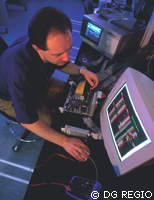EUREKA confirms launch of ITEA 2 and calls for SME joint venture for FP7
The European network for market-led research (EUREKA) has announced the launch of the ITEA 2 thematic cluster, designed to build on the success of its predecessor ITEA (information technology for European advancement). The new cluster was launched following a meeting of EUREKA high level representatives in Prague, the Czech Republic, on 20 October. ITEA 2 maintains the principle vision of ITEA, according to EUREKA, namely 'for Europe to maintain leadership in [the] new area of software-intensive systems and services [SIS]'. The case for ITEA 2 is set out in EUREKA's so-called blue book, which warns that: 'The growing interconnection of consumer electronic devices to provide a host of services in the home is placing a time bomb under the need for software development - a bomb that must be defused quickly to keep high level work in Europe.' It continues: '[T]he grand challenge is to devise, create and master the software architectures, technologies and systems, solutions and services for myriad applications including safety-, security-, and time-critical functions. Europe must face up to the software requirements gap - already a core issue of ITEA and a continuing challenge for ITEA 2.' Some three billion euro will be invested in the new cluster during its eight-year lifespan, starting in early 2006, with the aim of mobilising a total of 20,000 person years of work during that time. The focus areas for ITEA 2 projects are aerospace, automotive, consumer electronics, communications, medical, and automation/production. The companies behind the foundation of ITEA 2 are leaders in their respective fields, with most figuring in the world's top 100 companies. Electronics giants such as Alcatel, Nokia and Siemens are extending their support from the original ITEA, while others, such as European aeronautics manufacturer Airbus, are joining for the first time. According to Rudolf Haggenmüller, chair of the ITEA cluster, the success of such EUREKA clusters is based on their vision and strategic research agenda, as well as a core group of global players. 'SMEs [small and medium sized enterprises] have their place within clusters, but if you want global success you must have international players to place the results on the global market. That's why originally ITEA chose EUREKA as the platform for its work.' But while SMEs may not play a central role in large industrial clusters such as ITEA 2, they are the focus of another initiative proposed by EUREKA which was welcomed by Commission representatives at the meeting in Prague. EUREKA has a strong track record of involving small companies in its research projects, and the current participation rate of 40 per cent is nearly three times higher than the 15 per cent target set by the EU for SMEs in its research framework programmes. However, the financing structure of the EU's research programme is much more stable and predictable than that of EUREKA, and therefore EUREKA member states have proposed the EUROSTARS initiative, designed to combine the strengths of the two. According to Roel Kramer, who devised the initiative whilst chair of the EUREKA high level group under the previous Dutch presidency: 'EUREKA is generally perceived to be successful in attracting SMEs [...] whereas getting R&D-performing SMEs active in the EU's framework programme is harder. In particular, the bottom-up nature of EUREKA is very important, allowing SMEs the freedom to propose projects in any field.' Mr Kramer's proposal involves the establishment of a new legal entity separate from both EUREKA and the framework programme, which would manage the initiative and select projects for funding and run in parallel with the Seventh Framework Programme (FP7). Already 19 of EUREKA's member countries have pledged their support for EUROSTARS, and have agreed to commit over 40 million euro per year to the initiative. EUREKA hopes that the Commission will be prepared to match this commitment with EU funds, but understands that until agreement is reached in the Council on the EU's financial perspectives, the Commission is unable to formally commit its support for the initiative. Nevertheless, a Commission representative at the EUREKA Forum in Prague - Ezio Andreta, Director for Industrial Technologies within DG Research - told participants that the Commission considers EUROSTARS to be an important initiative and emphasised that scope has been provided for such a scheme in the proposed FP7 specific programmes. The specific programme text for the 'Capacities' pillar of FP7 includes a reference to 'a joint R&D programme for the benefit of research performing SMEs with the objective to boost their research and innovation capability'. It concludes: 'Building on EUREKA, it will stimulate and support transnational R&D projects led by such SMEs. This initiative complements other SME-targeted actions carried out in the context of the 7th Framework Programme. The Community will provide financial support to the initiative and will participate in the implementation by the means which are most appropriate for the action.'



